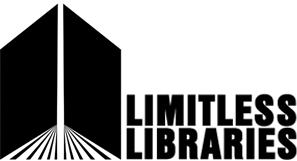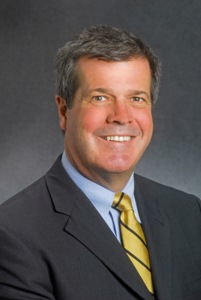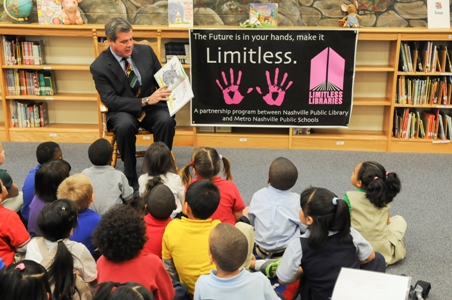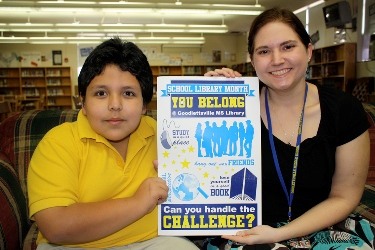2018 School Spending Survey Report
Libraries with No Bounds: How Limitless Libraries transformed Nashville Public Schools’ libraries
An ambitious partnership between Nashville Public Library (NPL) and Metro Nashville Schools has resulted in a successful program called Limitless Libraries.
 An ambitious partnership between Nashville Public Library (NPL) and Metro Nashville Public Schools has led to a successful program called Limitless Libraries. The program was launched in 2009, and since then circulation has soared with a near-threefold increase at one Nashville school; students have easier access to scores of popular digital books, DVDs, and Playaways; and public and school libraries have joined forces to create a new generation of lifelong library users. During the past three years, the program has grown to include 128 schools after starting at just four high schools, and students and teachers have checked out almost 100,000 items because of the easier access to the local public library. Nashville Mayor Karl Dean came up with the idea for the partnership in 2008 as he looked for ways to leverage the city’s resources. “Through this partnership, I believe we can create world-class libraries in our schools,” said Dean said at the time. Through Limitless Libraries, NPL has helped modernize and expand school collections by weeding out outdated books and by using the city’s purchasing power to efficiently acquire new material. Additionally, students and teachers have near-instantaneous access to NPL’s entire collection, plus several local university collections. School-issued student IDs are used as city library cards. Strong foundation for a bright future Because of Limitless Libraries, all of Nashville’s high school collections are up to the state standard of nine items per student with audiovisual resources in every school and key purchases made, including ebooks and the online resource Rosen’s Teen Health and Wellness. Easier than ever before, students and teachers can access all of NPL’s databases. In addition, about 200 ereaders were purchased, so every school librarian can check them out to students. School librarians feel empowered by the added attention that their programs are receiving. Nashville students can now tap into the city’s collection of more than 1.5 million items, which can be delivered straight to their schools. During the 2011–2012 school year, more than 97,000 items were sent to Metro Nashville Schools by courier. Even more encouraging, 25,000 students registered as NPL’s patrons, and 15,000 of them were first-time public library users. Nashville’s 74 elementary schools were added to the program this school year, making Limitless Libraries available in all 128 of the city’s traditional schools. There are plans to create hardy collections of audiovisual and English learner materials for elementary school students, and NPL recently teamed up with Follett to create a 2,500-item ebook collection. Additionally, the city is funding a longitudinal study of the program, in which the library will be working with education researcher Keith Curry Lance and his partners at RSL Research Group. The beginning stages From the get-go, a partnership seemed like a win-win situation. NPL already had an efficient, centralized collection development and procurement system, and librarians began identifying ways to work this system into high school libraries. It was clear that improvements to school libraries could easily be made by sharing resources and providing students with access to more learning materials.
An ambitious partnership between Nashville Public Library (NPL) and Metro Nashville Public Schools has led to a successful program called Limitless Libraries. The program was launched in 2009, and since then circulation has soared with a near-threefold increase at one Nashville school; students have easier access to scores of popular digital books, DVDs, and Playaways; and public and school libraries have joined forces to create a new generation of lifelong library users. During the past three years, the program has grown to include 128 schools after starting at just four high schools, and students and teachers have checked out almost 100,000 items because of the easier access to the local public library. Nashville Mayor Karl Dean came up with the idea for the partnership in 2008 as he looked for ways to leverage the city’s resources. “Through this partnership, I believe we can create world-class libraries in our schools,” said Dean said at the time. Through Limitless Libraries, NPL has helped modernize and expand school collections by weeding out outdated books and by using the city’s purchasing power to efficiently acquire new material. Additionally, students and teachers have near-instantaneous access to NPL’s entire collection, plus several local university collections. School-issued student IDs are used as city library cards. Strong foundation for a bright future Because of Limitless Libraries, all of Nashville’s high school collections are up to the state standard of nine items per student with audiovisual resources in every school and key purchases made, including ebooks and the online resource Rosen’s Teen Health and Wellness. Easier than ever before, students and teachers can access all of NPL’s databases. In addition, about 200 ereaders were purchased, so every school librarian can check them out to students. School librarians feel empowered by the added attention that their programs are receiving. Nashville students can now tap into the city’s collection of more than 1.5 million items, which can be delivered straight to their schools. During the 2011–2012 school year, more than 97,000 items were sent to Metro Nashville Schools by courier. Even more encouraging, 25,000 students registered as NPL’s patrons, and 15,000 of them were first-time public library users. Nashville’s 74 elementary schools were added to the program this school year, making Limitless Libraries available in all 128 of the city’s traditional schools. There are plans to create hardy collections of audiovisual and English learner materials for elementary school students, and NPL recently teamed up with Follett to create a 2,500-item ebook collection. Additionally, the city is funding a longitudinal study of the program, in which the library will be working with education researcher Keith Curry Lance and his partners at RSL Research Group. The beginning stages From the get-go, a partnership seemed like a win-win situation. NPL already had an efficient, centralized collection development and procurement system, and librarians began identifying ways to work this system into high school libraries. It was clear that improvements to school libraries could easily be made by sharing resources and providing students with access to more learning materials. 
Nashville Mayor Karl Dean
As a first step, a steering committee was convened, I was appointed to head up the project by Donna Nicely, who at the time was NPL’s director. We met with administrators from the public library, Nashville’s Metro Schools, and the mayor’s office. There’s no denying that the partnership demanded flexibility from every entity as each area would be required to do things differently. NPL and the school libraries were accustomed to operating in silos. But everyone involved agreed on the end goal: to provide students with the best possible library experience with ample selection choices. Concerns in the implementation process included public librarians who worried about whether staffing levels could handle the additional responsibilities of such a program. At the same time, high school librarians expressed concerns over being “taken over.” With a clear vision, strong leadership, and a collaborative mindset, the groups worked together to overcome these obstacles. NPL has received additional staffing, and high school librarians see nothing but benefits from the partnership. Next steps As a next step, high school media specialists were recruited for a pilot program. During meetings hosted at local schools, school librarians had the chance to express needs and concerns. Everyone worked together to find solutions for many valid concerns, including how the school library collections would be modernized. As an example of that collaborative spirit, both NPL and school library personnel worked together to weed outdated books off shelves. They manually pulled the books, boxed up the discarded titles, and, together, scrubbed the empty shelves. In meetings attended by both school and public librarians, they agreed not a single book would be purchased unless everyone agreed. To help with the process, Karen Lowe was hired as a consultant to help create guidelines for the weeding and purchasing decisions. Lowe is a veteran school library media coordinator, a college instructor, and the author of the definitive article on collection assessment, “Resource Alignment: Providing Curriculum Support in the School Library Media Center” (Knowledge Quest, November–December 2001). In the second semester of the 2009–2010 school year, we thoroughly assessed the school libraries’ collections. We tossed out antiquated or irrelevant titles and settled on what items to add. The city library also purchased 50 netbooks for the schools to lend to their students and teamed up with Ingram Digital to pilot 400 ebooks. Since the schools were now pooling their purchasing power, they were able to negotiate deeper discounts from vendors. There was also an increase in the number of vendors that schools did business with, and new arrangements were made for their orders to arrive processed and shelf-ready, which had never been done before. School librarians were thrilled that all that was required was to simply unpack the books and place them on the shelves.
Photo by Gary Layda
Through the roof The first four months of the program were truly remarkable. All of the pilot’s initiatives were accomplished, and a strong relationship with the school librarians was established. By the end of the pilot program in May 2010, circulation at all high school libraries had improved. The most significant increase was at the Pearl-Cohn Entertainment Magnet High School, an inner-city school, where circulation improved by an astonishing 286 percent. Weeded items, such as Little House on the Prairie and The Little Prince, were replaced with culturally relevant, engaging materials—many of which were in nonprint formats. Suddenly, school library collections became the hottest ticket in school. School librarians also discovered the power of audiobooks to attract students, especially reluctant readers and those who read below grade level. Audiobooks, especially Playaways, became huge hits, and school librarians have been quick to notice the difference they’ve made in many students’ lives. “One student comes in a couple of days a week with her Exceptional Ed teacher,” said a media specialist. “She does not like to read, but now she loves Playaways. She’s on her second book in three days.” And here’s what another high school librarian reported: “New seniors were faced with reading Metamorphosis. They were a bit behind. One borrowed the book on CD, the other [borrowed] the Playaway—and were they ever thankful.” Before the joint program got rolling, our school librarians never had the funds to purchase these types of resources.
School librarian Alison Maliszewski and seventh grader, Brandon Muñoz from Goodlettsville Middle School, Nashville, TN.
As a result of Limitless Libraries, many unexpected opportunities have emerged that are truly amazing. School libraries now regularly take part in public library programs, such as Teen Read Week and Food for Fines, an annual event in which patrons’ overdue fines are waived in exchange for jars of peanut butter, cans of soup, packages of pasta, and other food items that are donated to the local food bank. (Fines are reduced by one dollar for each item they contribute.) Plus, city and school librarians have started to talk more to one another, sharing valuable information about programming, reading lists, and upcoming events. In short, everyone has started to communicate more about how best to serve students. When Lowe conducted a survey at the beginning of the first year, she found that half of the respondents were fearful or skeptical of the program. But in a similar survey conducted at the end of that school year, not a single librarian objected to it. In fact, at the end of that first year, these are the types of comments that were heard from media specialists: “NPL spent the mayor’s money so wisely and improved my collection. In fact, my circulation is up 170 percent over last year and school just started. I am thrilled.” And “I’ve been telling other librarians what a great experience it was participating in the NPL/MNPS pilot project…. [It’s] a win-win for everyone.” Not surprisingly, librarians who have participated in the pilot program have become evangelists for Limitless Libraries, soothing the fears of their colleagues and assuring them that the school and public library are truly partners. When funding was expanded for the 2010–2011 school year to include all 16 of the city’s high schools, we immediately planned an in-service session with the additional school librarians. We devoted plenty of time to getting their input, listening to their concerns, and following through. By working in a collaborative way, we gained their trust. Students have responded favorably to the program, and circulation statistics are going through the roof. The program has been improved every step of the way. Working with school administrators and city attorneys right before the 2010–2011 academic year began, a Memorandum of Understanding was drafted to allow schools to share student-directory and parental permission information with NPL. This allows Limitless Libraries to receive daily updates on student data to import into NPL’s Innovative Millennium system. As mentioned, students’ IDs now serve as their public library cards. City library staffers know if students have permission to use the courier service and place holds on public library items. The school courier visits the main library every day, and students with permission can pick up their public library materials at their school library. Home information is updated if it changes at school. Kent Oliver, NPL’s director, fully embraces the vision of Limitless Libraries. “I look forward to continued growth and success of the program as we seek ways to further expand Limitless Libraries and make a literary impact on our youth.” Limitless Libraries is truly groundbreaking, and it’s being modeled around the country. Any public school system and public library can replicate Limitless Libraries. As stated in the Limitless Library motto, which was penned by a Nashville eighth grader, “The future is in your hands, make it limitless.” Tricia Racke Bengel is NPL’s associate director for collections and technology services. In March 2012, Library Journal (SLJ’s sister publication) named her a “Mover and Shaker” To find out more about Limitless Libraries, visit www.limitlesslibraries.org.RELATED
RECOMMENDED
CAREERS
The job outlook in 2030: Librarians will be in demand
CAREERS
The job outlook in 2030: Librarians will be in demand
ALREADY A SUBSCRIBER? LOG IN
We are currently offering this content for free. Sign up now to activate your personal profile, where you can save articles for future viewing






Add Comment :-
Comment Policy:
Comment should not be empty !!!
Top Picks Thursday 01-24-2013 « The Author Chronicles
[...] are awesome. Nashville’s Limitless Libraries program brings together public and high school libraries and sees library patron...; the Digital Public Library of America project seeks tobring together in one search engine all the [...]Posted : Jan 24, 2013 11:05
Tee Cartwright
Oops books. Sorry for the typo.Posted : Jan 16, 2013 12:40
Kelly Benning
How on earth is Little House on the Prairie - a story of American pioneers - not culturally relevant? And The Little Prince is not engaging? Since when? Political correctness won in that weeding decision. Also, just because books are ordered already processed does not mean that one can simply unbox them and put them on the shelves. The MARC information must be uploaded into the system. It appears that the school librarians were against the idea at the start, fearing they were going to get "taken over." By whom? Make yourself relevant and useful. As a high school librarian, this frustrates me. Why did they have to hire media specialists? Why weren't the school librarians qualified to take on those tasks? They should have been. Way too many librarians are stuck in 1972 and it perpetuates a horrible stereotype of the old-timey, inflexible "shusher" who has outlived her usefulness.Posted : Jan 16, 2013 07:31